Hiver is a shared inbox tool for businesses looking to optimize Gmail for scale. It works inside Gmail and offers basic help desk functionality.
If your support team is using a Gmail account to receive and respond to email requests, you may have noticed it’s not a scalable solution. Standard email management software is effective for personal messages or official communication but isn’t efficient for large support teams.
That said, you may be looking for a customer service tool with more advanced capabilities.
Good news—
We have compiled the best options in this category for you!
In this article, we will explore the following Hiver alternatives:
| Hiver alternative | G2 rating | Free plan | Best for |
|---|---|---|---|
| Tidio | 4.7/5 ⭐️ | ✅ | AI chatbots |
| Zendesk | 4.3/5 ⭐️ | Free trial available | Live chat |
| Freshdesk | 4.4/5 ⭐️ | ✅ | AI ticketing tool |
| LiveAgent | 4.5/5 ⭐️ | Free trial available | Omnichannel functionality |
| Help Scout | 4.4/5 ⭐️ | Free trial available | Shared inbox |
| Kayako | 4.0/5 ⭐️ | Free trial available | Various customization options |
| Intercom | 4.5/5 ⭐️ | Free trial available | AI assistant |
| HubSpot | 4.4/5 ⭐️ | ✅ | CRM |
| Kustomer | 4.4/5 ⭐️ | ❌ | Conversational self-service |
| Zoho Desk | 4.4/5 ⭐️ | ✅ | Automation tools |
First things first, let’s explore the drawbacks of Hiver.
Why should people look for a Hiver alternative?
Hiver’s shared inbox solution assists your agents in assigning and responding to support queries. It provides a Google workspace for agents to collaborate across multiple channels like email, live chat, chatbot, voice communication, and knowledge base.
On top of that, Hiver’s Kanban boards offer workflow visualization for project management, allowing teams to set their projects’ status and monitor the progress of tasks.
However—
It can be limiting for larger customer support agents looking to achieve more than just Gmail-based collaboration.
Let’s check out some of the drawbacks of Hiver:
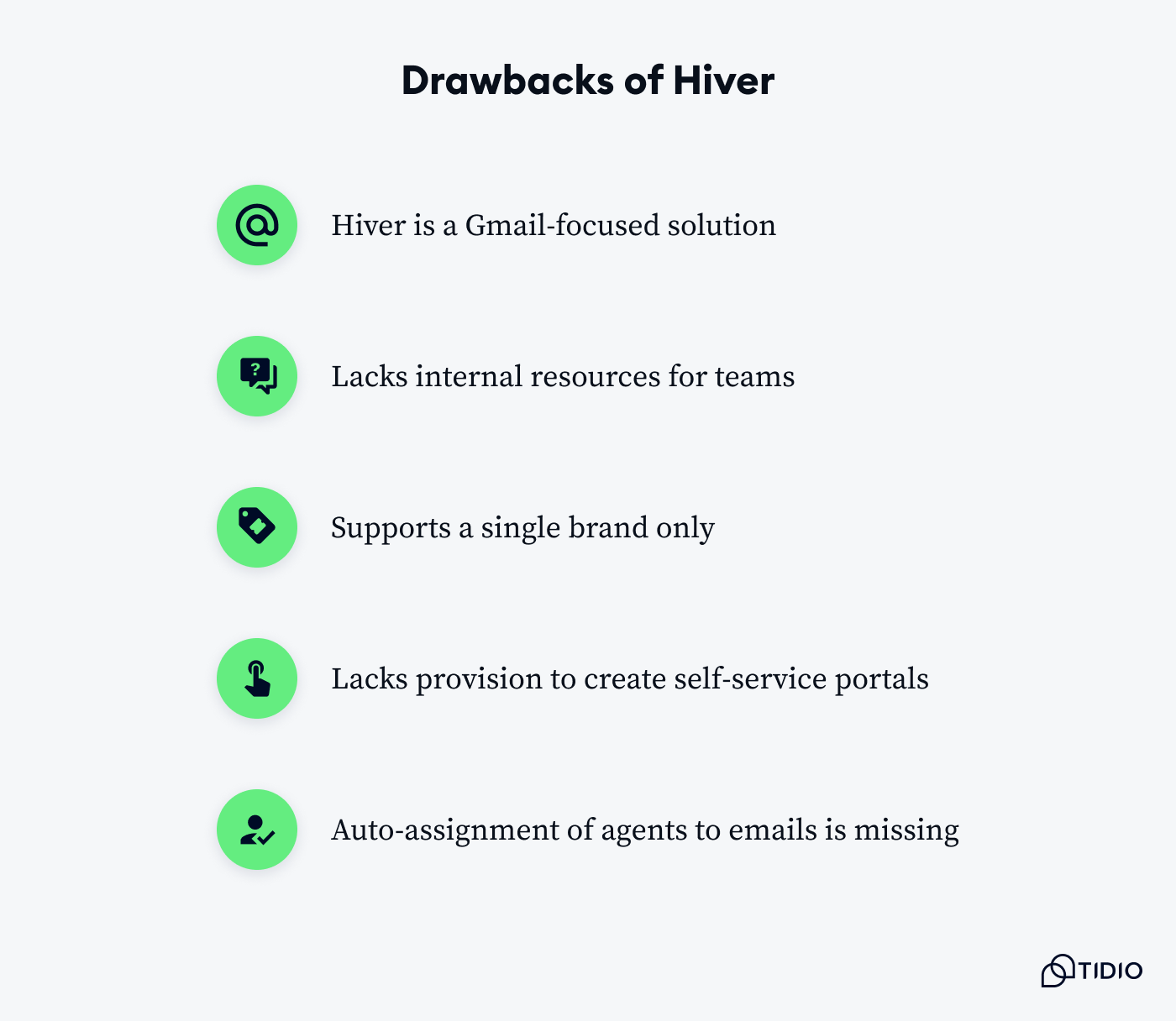
- Hiver is a Gmail-focused solution—the software is built purely to operate on Gmail and not any other email client. It can become restricting as your business grows and your needs become more complex. Plus, research shows that 9 in 10 consumers want a consistent omnichannel experience.
- Lacks internal resources for teams—Hiver has no provision for setting up an internal knowledge base for your representatives. This feature is useful for agents for troubleshooting issues or responding to tickets. It also lacks internal FAQs for teams to consult when responding to requests.
- Supports a single brand only—the solution is not configurable to display separate support windows. If your organization has multiple brands, you can’t set up separate portals for customers to narrow their requests. This would help improve the turnaround response time for submitted tickets.
- Lacks provision to create self-service portals—while the software offers an external knowledge base feature, it can’t configure customer self-service channels. In fact, close to 70% of consumers prefer self-service as a form of client support.
- Auto-assignment of agents to emails is missing—while Hiver allows you to assign support messages to certain agents, you can’t assign multiple reps to a conversation. This is important for continuity of service as one report shows consumers expect CS teams to have their support history.
Read more: Learn how Tidio’s support achieved 58% of automation.
10 best Hiver alternatives
Although Hiver is simple and comes with many collaboration features like assigning emails and automating processes, it has several limitations when compared to genuine help desk software.
Here’s a detailed list of the top Hiver alternatives for your support team.
1. Tidio
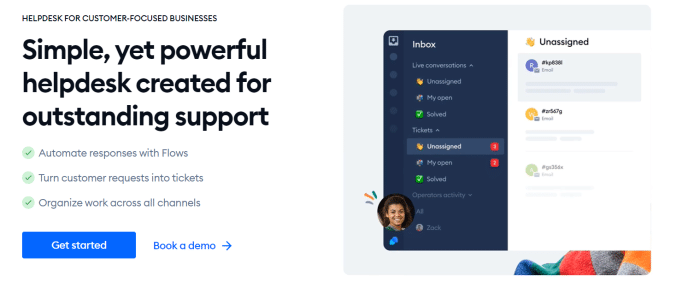
Ratings: 4.7/5 ⭐️ (1,435+ reviews)
Tidio is a help desk software that provides innovative features to support ecommerce startups. The platform is renowned for its AI chatbots that are useful in solving basic support requests. Its use of conversational AI to craft responses to routine requests reduces the workload for agents.
The Tidio help desk ensures all communication flows through a single, shared inbox. Teams can schedule tasks and keep track of user web activity in real time. On the other hand, managers can view the in-platform metrics to track the team’s performance.
Main features:
- Multi-channel support like email, social networks, and SMS
- AI and NLP chatbots
- Shared inbox functionality
- 120+ third-party integrations
- Customer segmentation
- In-built email templates
- 7-day free trial available
- Free version available
- Starter ($29/mo)
- Growth (starts at $59/mo)
- Plus (starts at $749/mo)
- Premium (starts at $2999/mo)
Read more: Learn all about how to use Tidio’s conversational AI. Also, compare the top Tidio competitors and decide which one wins the title of the best customer experience platform
Improve the quality of customer service with a practical help desk tool
2. Zendesk
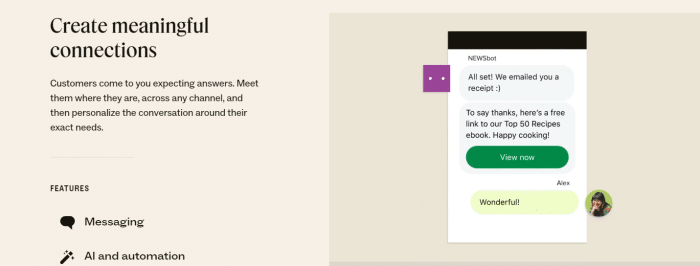
Ratings: 4.3/5 ⭐️ (5,810+ reviews)
Zendesk is a help desk solution that allows businesses to grow revenue and build customer loyalty. The tool seeks to create meaningful connections through AI and automation, a help center, and live chat capabilities. Its agent workspace allows team members to unify all channels and collaborate seamlessly on resolving requests.
In addition, Zendesk offers a fully integrated help desk management and ticketing system to sort, arrange, and solve all tickets. Also, its knowledge base offers self-service for consumers and empowered teams. Employees can unpack useful data and monitor help desk metrics.
Pros:
- Routing and intelligence tools
- Workforce management solution
- Social media integrations
Cons:
- Expensive for add-ons
- Email notification outages
- Complex to use for beginners
- Free trial available
- Basic Plan ($19/mo/agent)
- Suite Team ($69/mo/agent)
- Suite Growth ($115/mo/agent)
- Suite Professional ($149/mo/agent)
- Suite Enterprise (Contact sales)
- Suite Enterprise Plus (Contact sales)
Read more: Learn more about the best Zendesk alternatives for your project management needs.
3. Freshdesk
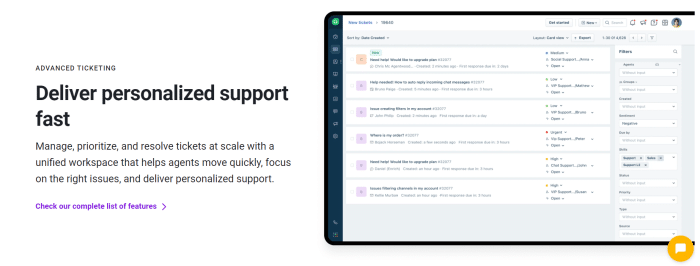
Ratings: 4.4/5 ⭐️ (3,100+ reviews)
Freshdesk is a user-friendly help desk software for scaling businesses. The solution is popular for its communication suite powered by AI technology. The G suite combines customer care channels, an IT service desk, and CRM into a single location.
Moreover, Freshdesk provides a unified workspace for agents to collaborate on requests. Its ticketing system allows team members to sort and prioritize requests according to the level of urgency. The team can populate its scalable knowledge base with relevant content for customer self-service. This Hiver alternative can be accessed by enterprise clients through its Microsoft Teams integration.
Pros:
- Customer support SLAs
- Automation and help desk workflows
- AI live chat
Cons:
- Customization issues
- Upgrade to enterprise plan for extensive capabilities
- Requires more reporting options
- Free version available
- Growth ($18/mo/agent)
- Pro ($59/mo/agent)
- Enterprise ($95/mo/agent)
Read more: Learn about the best Freshdesk alternatives for your customer support.
4. LiveAgent

Ratings: 4.5/5 ⭐️ (1,480+ reviews)
LiveAgent is an all-in-one customer experience software for growing enterprises. The solution aims to personalize client interactions through its multi-channel toolset comprising 130+ tickets. Moreover, users can integrate over 200 service tools such as Shopify, WordPress, Mailchimp, and more.
LiveAgent offers collaboration tools and omnichannel capability. According to its website, the solution has the fastest chat widget on the market. The widget is easy to implement and can help organizations to increase their earnings by 48%. The feature can be integrated into SMS, WhatsApp, Slack, Facebook Messenger, and more.
Pros:
- Innovative live chat feature
- Social media integrations
- Multiple ecommerce integrations
Cons:
- A mobile version is basic
- Email notification issues
- Inferior UX for admin portal
- Free 2-month trial available
- Small business ($15/mo/agent)
- Medium business ($35/mo/agent)
- Large business ($59/mo/agent)
- Enterprise ($85/mo/agent)
5. Help Scout
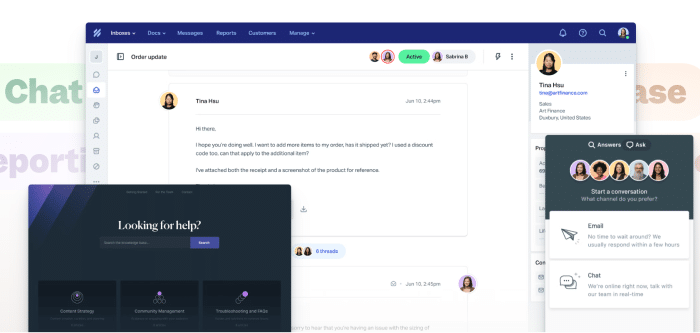
Ratings: 4.4/5 ⭐️ (400+ reviews)
Help Scout is an intuitive help desk tool that assists small and medium-sized enterprises to scale. Unlike enterprise solutions that are challenging to set up and require professional admins to manage them, Help Scout focuses on simplicity and brings value to their clients. So far it has delivered support for more than 12,000 organizations.
The tool also allows agents to collaborate and send responses through a shared inbox. By using automated ticketing workflows, employees can reduce response times to requests. Moreover, it uses AI to enhance replies, highlight mentions, summarize conversations, and streamline support operations.
Pros:
- In-built custom reports
- 50+ service tools
- Self-service knowledge base
Cons:
- Presence of bugs
- Few knowledge base templates
- Limited in-platform analytics
- Free 15-day trial available
- Standard ($25/mo/user)
- Plus ($50/mo/user)
- Pro ($65/mo/user))
Read more: Explore the best Help Scout alternatives you can implement for your team.
6. Kayako
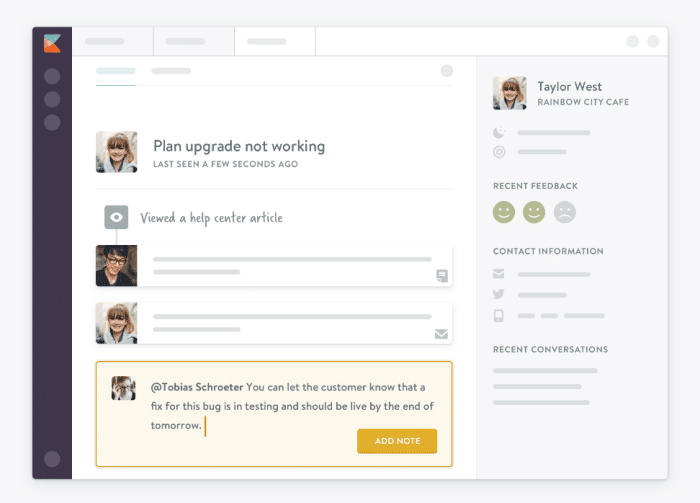
Ratings: 4.0/5 ⭐️ (215+ reviews)
Kayako is a SaaS tool that helps small teams deliver seamless support to their consumers. It serves as a useful interdepartmental help desk and service desk. Furthermore, it offers a collaborative space for your agents to resolve requests.
Its ticketing system simplifies the sorting of tickets and sends alerts to concerned employees. Team members can attach notes and files to provide a client interaction history. The ticketing system can arrange tickets in order of priority and urgency.
Pros:
- Scalable platform
- Solid ticketing system
- Multiple customization options
Cons:
- Costly add-ons
- Restrictive analytic capability
- Low email capacity
- Free trial available
- Kayako Cloud (request cloud contracts)
- Classic On-Prem (request quote)
Read more: Check out the best Kayako alternatives on the market.
7. Intercom
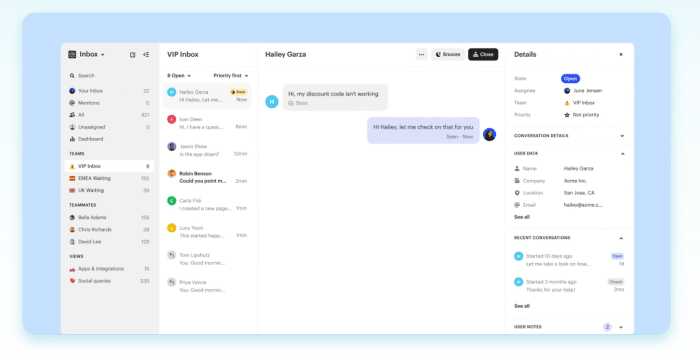
Ratings: 4.5/5 ⭐️ (2,950+ reviews)
Intercom is a comprehensive customer service software that offers seamless support through automation. The system delivers superior client satisfaction while optimizing costs. The system aims to automate customer interactions and free up agents to focus on higher-value tasks.
Employees can use Intercom’s AI-powered workspace to cooperate on resolving requests. The workspace consists of team mailboxes, help centers, and ticketing solutions. The AI can help to summarize conversations, create personalized responses, and improve workflows.
Pros:
- Live chat on Slack
- CRM capability through Salesforce integration
- Shared team inbox
Cons:
- The steep learning curve for configuring workflows
- Limited functionality on the mobile app
- Basic search functionality
- Free 14-day trial available
- Essential ($39/mo/seat)
- Advanced ($99/mo/seat)
- Expert ($139/mo/seat)
Read more: Here are the best Intercom alternatives to improve your support processes.
8. HubSpot
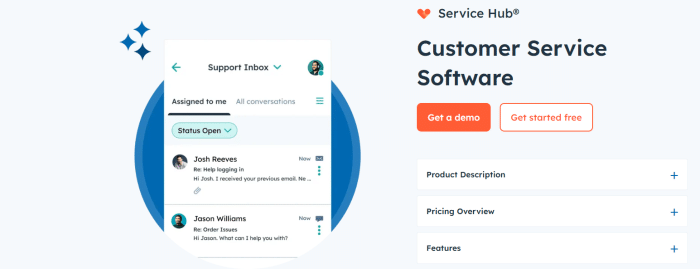
Ratings: 4.4/5 ⭐️ (2,225+ reviews)
HubSpot is an all-encompassing help desk and project management tool that assists SMEs in serving their consumers and growing exponentially. Sales managers can use its free CRM to manage the sales pipeline by creating new opportunities, assigning tasks, and following up on sales conversions. The CRM integrates with your email to trigger message sequences, log responses, and update contact details.
Its live chat tool can help generate leads and process support requests. Agents will have a quicker turnaround for requests. Also, managers can delegate tickets to the relevant team members and follow up on progress.
Pros:
- AI-powered smart CRM
- Collision detection
- Shared inbox capabilities
Cons:
- Limited analytics and reporting
- Cluttered user interface
- Costly upgrades
- Free version available
- Starter ($20/mo/)
- Professional ($1,200/mo/)
- Enterprise (Starts at $4,000/mo/)
Read more: Check out the best HubSpot alternatives and competitors available.
9. Kustomer
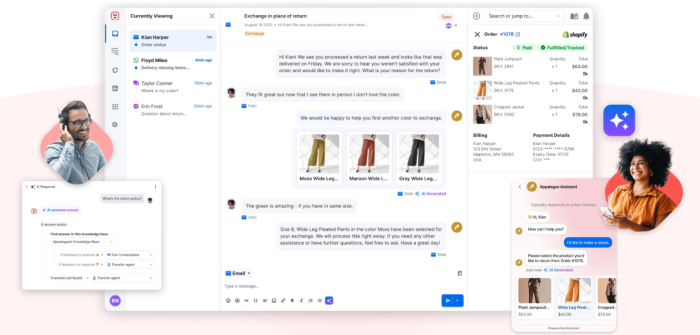
Ratings: 4.4/5 ⭐️ (410+ reviews)
Kustomer is an innovative customer service platform designed to support high-volume requests by optimizing client experiences. This alternative provides a unified view of all communication channels to improve productivity and deliver personalized service. By using proactive customer service, businesses can leverage data to anticipate their audience needs.
According to the creators of the tool itself, Kustomer’s AI functionality drives business efficiency by over 40% and increases agency productivity by 65%. The CRM offers an easy-to-navigate, searchable, and SEO-friendly knowledge base for consumers. Also, the AI serves to automate repetitive tasks, use canned responses, and share request prompts with agents.
Pros:
- AI chatbot
- Configurable bot APIs
- Self-service knowledge base
Cons:
- Problems routing contacts
- Buggy workflow engine
- Fewer integrations
- Enterprise ($89/mo/user)
- Ultimate ($139/mo/user)
10. Zoho Desk

Ratings: 4.4/5 ⭐️ (5,380+ reviews)
Zoho Desk is another help desk tool that focuses on automating client support services. The live chat and ticketing system is useful in tracking requests across multiple channels. It offers shared mailboxes for inter-departmental cooperation.
The system provides omnichannel capability and automation tools. Its contextual AI can auto-tag tickets, share canned responses, and undertake sentiment analysis. Lastly, agents can get live performance insights and access the mobile version on iOS and Android.
Pros:
- Shared inbox
- Contextual AI
- Trello integration
Cons:
- The steep learning curve for new users
- Confusing email integration
- Cluttered user interface
- Free version available (for minimal support needs)
- Zoho Desk Express ($9/mo/user)
- Standard ($20/mo)
- Professional ($35/mo)
- Enterprise ($50/mo)
Read more: Discover a full distribution list vs shared mailbox comparison with pros and cons included.
Hiver alternatives: key takeaway
If you are looking to transition to a dedicated Hiver alternative, you must consider that most solutions have innovative features. However, they spread tools in different packages and reserve most functionalities to costly plans. This puts you in the difficult position of having to fork out more money to upgrade your software, and add an agent or access an additional feature.
While all competitors on our list offer great customer service and help desk features, we think Tidio is the best Hiver alternative for your company considering the price and quality ratio. Also, the software is easy to use, requires minimal training, and is fully customizable to your organization’s needs.
Why not give it a try?
Get the best Hiver alternative on the market

